Maracaibo Province was a province of the 1824 created Zulia Department of Gran Colombia. The capital was Maracaibo.
The Zulia Department was a successor of the Maracaibo Province (Spanish Empire).
1830 it became Maracaibo Province (Venezuela).
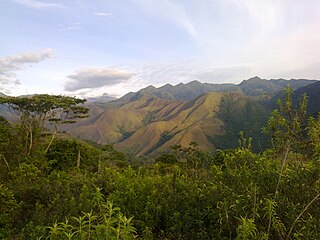
Zulia State is one of the 23 states of Venezuela. The state capital is Maracaibo. As of the 2011 census, it has a population of 3,704,404, the largest population among Venezuela's states. It is also one of the few states in Venezuela in which voseo is widespread. The state is coterminous with the eponymous region of Zulia.

Maracaibo is a city and municipality in northwestern Venezuela, on the western shore of the strait that connects Lake Maracaibo to the Gulf of Venezuela. It is the second-largest city in Venezuela, after the national capital, Caracas, and the capital of the state of Zulia. The population of the city is approximately 2,658,355 with the metropolitan area estimated at 5,278,448 as of 2010. Maracaibo is nicknamed "The Beloved Land of the Sun".
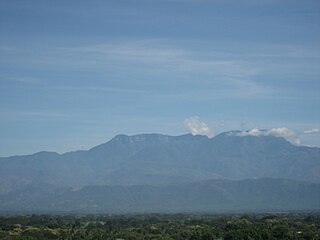
The Serranía del Perijá, Cordillera de Perijá or Sierra de Perijá is a mountain range, an extension of the eastern Andean branch, in northern South America, between Colombia and Venezuela, ending further north in the Guajira Desert, a total distance of about 310 kilometres (190 mi). It separates the Maracaibo Basin from the Cesar-Ranchería Basin. Some of the area has been considered as a Flora and Fauna Sanctuary.
Rosario, or La Villa del Rosario is a town of Venezuela in the Zulia State. It is located about sixty miles southwest of Maracaibo, the State Capital. La Villa del Rosario is the capital of Rosario de Perijá Municipality. It has about 120.000 inhabitants(2007). Its economy is based on cattle-raising, agriculture and milk production. It is said that this municipality is the first milk producer in Venezuela.

Catatumbo lightning is an atmospheric phenomenon that occurs over the mouth of the Catatumbo River where it empties into Lake Maracaibo in Venezuela. Catatumbo means "House of Thunder" in the language of the Bari people. It originates from a mass of storm clouds at an altitude of more than 1 km (0.6 mi), and occurs for 140 to 160 nights a year, nine hours per day, and with lightning flashes from 16 to 40 times per minute. It occurs over and around Lake Maracaibo, typically over a bog area formed where the Catatumbo River flows into the lake. The phenomenon sees the highest density of lightning in the world, at 250 per km2. In summers, the phenomenon may even occur as dry lightning without rainfall.
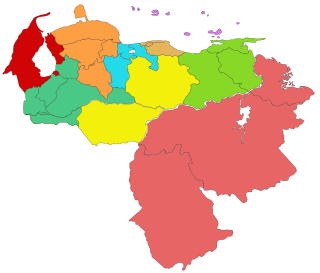
The Zulian Region is one of the 10 administrative regions into which Venezuela is divided for its development plans. This region is coterminous with Zulia State and is administrated by CORPOZULIA. The people from this region seek autonomy from the central government.

The Climate of Venezuela is characterized for being tropical and megathermal as a result of its geographical location near the Equator, but because of the topography and the dominant wind direction, several climatic types occur which can be the same as found in temperate latitudes, and even polar regions. Latitude exerts little influence on the Venezuelan climate. While the coastal cities of Maracaibo, Barcelona, Porlamar and Maiquetia can get extremely hot, cities in valleys such as Mérida, Caracas, Los Teques and San Cristobal have cooler climates, and the highest towns of Mucuchies and Apartaderos have cold (tundra) climates.

Maracaibo Province was a historical region of Venezuela that corresponds roughtly to the actual Zulia State.
Zulia Canton was a canton in Maracaibo Province, Zulia Department, Gran Colombia, now in Venezuela.
Falcón Zulia state was a state of Venezuela created by initiative of president Antonio Guzmán Blanco.

Eduardo López Rivas was a Venezuelan editor and journalist. He founded and directed several Venezuelan publications throughout his life, among them the newspaper Diario El Fonógrafo and the magazine El Zulia ilustrado. He was the founder and owner of a Venezuelan editorial house, Imprenta Americana, the first publishing house to print photographs in Venezuelan periodical publications.
Carlos Arturo López Bustamante (1890–1950) was a Venezuelan journalist. He was born in Maracaibo, Venezuela in 1890 and died in Chicago, USA in 1950. He was known for his fierce opposition to the dictator Juan Vicente Gómez from the pages of Diario El Fonógrafo newspaper. López Bustamante was the son of journalist Eduardo López Rivas, editor and owner of the Maracaibo newspaper, Diario El Fonógrafo, the magazine El Zulia ilustrado and the publishing house Imprenta Americana. His mother was Doña Carmen Bustamante López, niece of Venezuelan physician Francisco Eugenio Bustamante and a descendant of General Rafael Urdaneta. Doña Carmen died when Carlos was only a child.
Japrería (Yapreria) is a Cariban language of Venezuela.
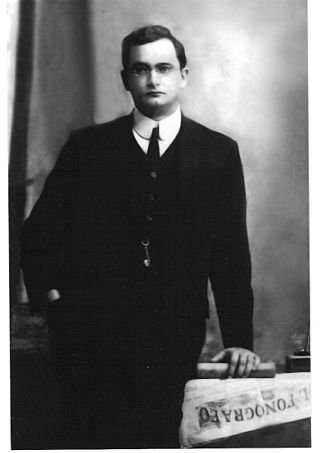
Eduardo López Bustamante was a Venezuelan journalist, lawyer and poet. He was a leading intellectual of the Zulia State, Venezuela, and a figure within Venezuelan jurisprudence.

Imprenta Americana was the first publishing house that printed illustrations and photographs in Venezuelan periodicals. It was founded by editor and journalist Eduardo López Rivas, in Maracaibo, Venezuela, in 1881.

Sierra de Perijá National Park, also known as Perijá National Park is a protected area in western Venezuela, in the Serranía de Perijá mountains, on the border with Colombia. The national park, located southwest of Zulia state and Lake Maracaibo, was established in 1978 with the objective of protecting the biodiversity of the hilly regions.

Because of its natural structure, Venezuela can be divided into eight very distinct natural regions. In the evaluation of a natural region, the human element is not present. The natural region groups of Venezuela formed as a consequence of the association of geo-physical elements such as: geological constitution, relief, climate, hydrography, vegetation, soils, among others.
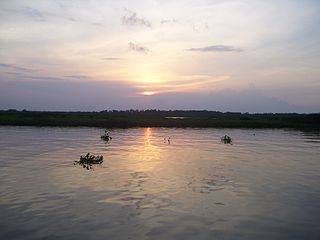
The Ciénagas del Catatumbo National Park Also Catatumbo Marshes National Park or Ciénagas de Juan Manuel National Park Is a protected area of Venezuela.
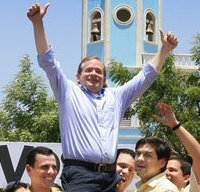
Juan Pablo Isidoro Guanipa Villalobos is a Venezuelan lawyer and politician who served as deputy and First Vice President of the National Assembly, leader of the Justice First political party and former governor of Zulia. He was a presidential candidate in the 2018 elections until boycott. Guanipa is the regional coordinator of the Justice First party in Zulia and chairs the Maracaibo Posible foundation.
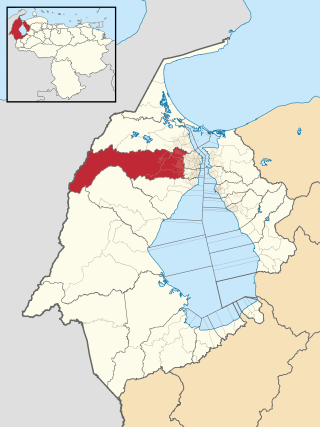
Jesús Enrique Lossada is a municipality in the metropolitan area of Maracaibo, Venezuela's second largest city. Jesús Enrique Lossada covers an area of 3,533 square kilometres (1,364 sq mi) and recorded a population of 118,756 in the 2011 Venezuelan census. It is named after Jesús Enrique Lossada (1892–1948), a distinguished lawyer, politician, professor, and writer from Maracaibo.